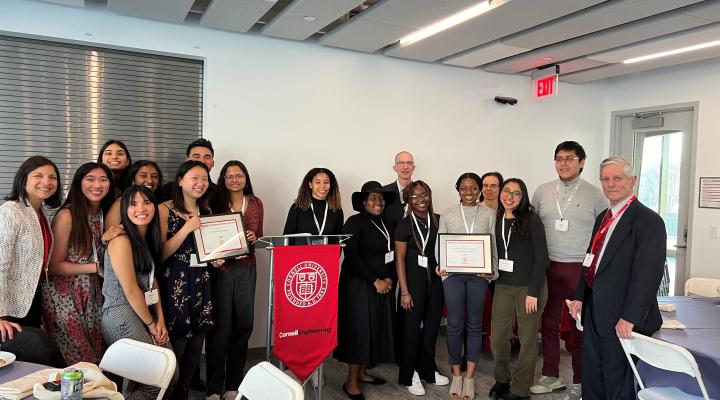Qi Li has joined the School of Civil and Environmental Engineering at Cornell as an assistant professor. Li is interested in fluid dynamics, heat transfer, and hydrologic processes in the built environment.
Born in China’s Gansu Province, Li was the first in her family to go to college. As a teenager she won a scholarship from the Singapore Ministry of Education to attend high school in Singapore. “There was a culture at my high school of going overseas for college. Most of my friends went to Oxford or Cambridge,” says Li. “I did not know what I wanted to study so I applied to a place where I could take some time and really explore my options.” That place was Carleton College in Northfield, Minnesota, where Li took an introductory physics class as a freshman and, as part of the class, helped build a working trebuchet. She was hooked and became a physics major. She later added a second major—mathematics.
As an undergraduate majoring in physics and mathematics at Carleton, Li knew she wanted to go on to earn a graduate degree in some quantitative field, but she was not sure which. “Underlying my decision about what to study,” says Li, “was the question ‘How can I use my quantitative skills to do something I am passionate about?’”
In her third year at Carleton, Li went to Copenhagen to attend the World Climate Summit. This experience helped Li decide to pursue a Ph.D. in Civil Engineering at Princeton University. At Princeton, Li worked with Professor Elie Bou-Zeid, focusing on environmental fluid mechanics in the built environment. Her work shifted over time to look at urban surface interactions with air flow and the transport of pollutants.
Li earned her Ph.D. in 2016. She then spent two years at the Woods Hole Oceanographic Institute as a Geophysical Fluid Dynamics Fellow. Li came to Cornell in the summer of 2018.
At Cornell Li’s approach includes both high-performance computing (large-eddy simulations and direct numerical simulations) and field data to develop a physical understanding of the transport of momentum, energy, and mass in the built environment. Examples of her current research topics are improving the representations of urban areas in regional weather models and dispersion modeling with an improved urban micrometeorological component.
Li notes that 50% of the world’s population now lives in urban areas and many of the most drastic consequences of climate change are felt in cities.
“I am doing fundamental research with the trust that it will affect questions of urban sustainability, resilience and the well-being of people in cities,” says Li. “Without doing this research how can we know if current models are suitable for attacking the emerging problems , and, if so, how they need to be adjusted? I want to contribute to answering the question ‘with the Earth’s climate changing, how can we change the way we build cities?’”




